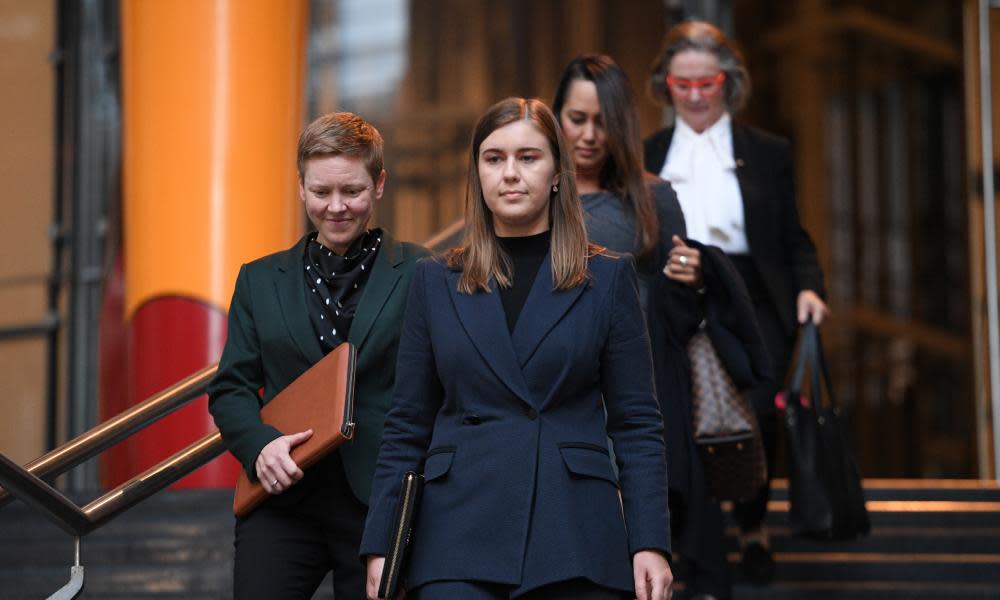Labor says parliament complaints mechanism should be able to investigate allegations against departed staff

Labor says a new independent complaints mechanism to be established for federal parliamentary staff in the wake of the Brittany Higgins furore needs a broader remit so it can retrospectively investigate serious incidents.
The opposition has responded to the main recommendations of the Foster review undertaken by a deputy secretary in Scott Morrison’s department after the Higgins rape allegation became public.
Stephanie Foster recommended that parliamentary staff be given access to a new independent complaints mechanism to deal with incidents of alleged sexual assault and harassment along with serious bullying. She also suggested that a serious incident team should be developed to deal with incidences of sexual assault such as that alleged by Higgins.
A partial brief of evidence relating to the alleged sexual assault of Higgins at Parliament House in early 2019 has now been handed to ACT’s top prosecutor.
Related: Independent body needed to deal with allegations by Canberra parliamentary staff, review finds
While recommending more normalised human resources practices for parliamentary staff, Foster also recommended that “in its initial phase” the independent mechanism should only cover complaints related to the current term of parliament, and where the parties remained in parliament or their employment was still covered by the Member of Parliamentary Staff Act.
This restriction would prevent the new body from investigating incidents such as the Higgins complaint, the solo sex act incident, and former Liberal staffer Rachelle Miller’s complaint she was frozen out after a consensual affair with Alan Tudge.
Three shadow ministers, Don Farrell, Tanya Plibersek and Katy Gallagher, have now written to Foster responding to her review.
In the letter, seen by Guardian Australia, the three Labor members support the idea that the new scheme should cover the period since the 2019 election, but “we are of the view that there should be the capacity to entertain complaints, at least on a discretionary basis, up to six months after the departure or termination of a complainant”.
They argue alleged incidents that occurred between the 2019 election and the introduction of the new framework should be able to be investigated “regardless of whether and when the complainant has departed”.
“If the exclusion as currently drafted stands, capacity to investigate a serious issue of sexual harassment or bullying can be frustrated simply by terminating a potential complainant’s employment or coercing their resignation,” the shadow ministers write.
“This cannot be the intent of the proposed scheme. Options to address behaviour by the alleged respondent, or managerial responses to that behaviour even if the respondent has left employment, should also be explored.”
The three Labor frontbenchers also tell Foster issues of privilege and parliamentary sovereignty will need to be explored and clarified before the new system commences.
In response to a recommendation by Foster to control after-hours access to Parliament House, the three say those issues should go to the privileges committee “to ensure that adequate safeguards are in place and that any change does not diminish parliamentary privilege”. But they also make clear that after-hours access “should only occur in pressing circumstances and for work-related reasons”.
In her review, Foster described parliament as a “pressured, complex, inherently insecure and intensely political environment” with a culture of intense scrutiny, “power dynamics”, “concerns about employment security creating unwillingness to complain, and reluctance to challenge unacceptable behaviour of ‘high value’ staff and parliamentarians”.
Foster said the review, triggered by “deeply distressing reports of an alleged sexual assault in a ministerial office in March 2019”, was a “watershed moment” for parliament to change its culture.
Farrell, Plibersek and Gallagher say they are “committed to working with anyone in this building who wishes to make the parliamentary workplace a safe place”.
In Australia, the crisis support service Lifeline is 13 11 14.


